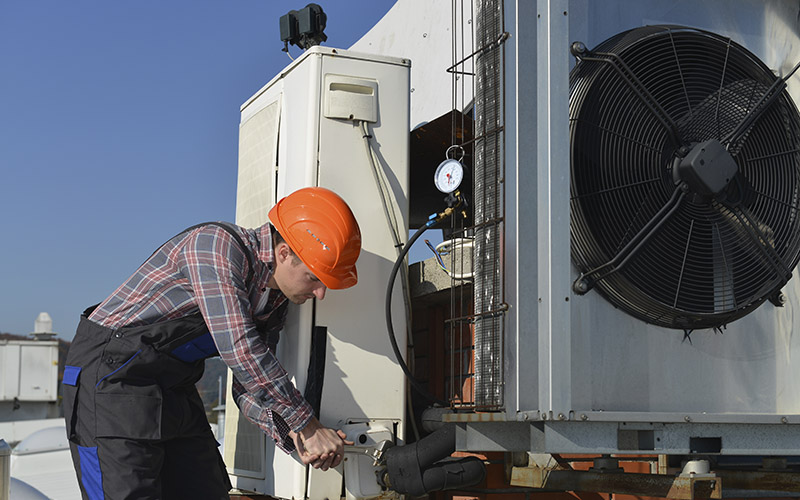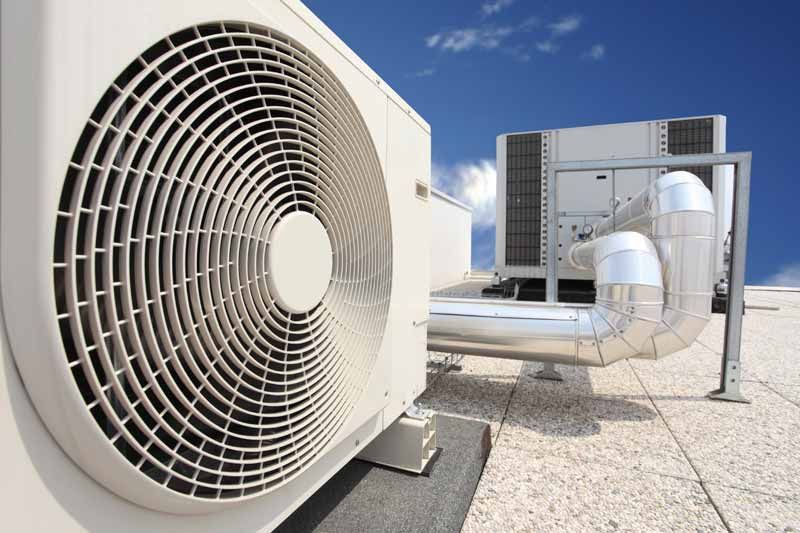Must-Know Details Before heat pump installation ooltewah tn
Must-Know Details Before heat pump installation ooltewah tn
Blog Article
Picking In Between a Heatpump and Furnace: Key Considerations for Your HVAC Needs
When examining home heating alternatives for cooling and heating needs, the choice in between a heatpump and a heating system can be complicated. Each system provides unique advantages tailored to specific climates and power performance objectives. Recognizing these differences is necessary for making an enlightened option. Secret variables such as installment expenses and ecological influence further complicate the option procedure. Which alternative truly straightens with one's convenience and sustainability preferences? The following areas will certainly explore these factors to consider carefully.
Understanding Heat Pumps: Exactly How They Function and Their Advantages
While many house owners take into consideration numerous heating alternatives, comprehending how heatpump feature and their advantages can significantly influence their decision. Heatpump run by moving warmth instead of creating it. In the winter season, they draw out heat from the outdoors air or ground and transfer it inside, while in the summertime, they reverse this procedure, cooling the home by expelling warm outside. This dual capability makes them flexible for year-round environment control.One of the main advantages of heatpump is their power effectiveness. They use substantially less electrical power compared to typical heater, possibly resulting in lower energy costs (ductless mini splits). Furthermore, heatpump have a smaller sized carbon footprint, making them an eco-friendly choice. They likewise call for less maintenance than traditional systems, adding to lasting cost savings. Generally, recognizing the mechanics and advantages of warm pumps can assist home owners make informed decisions concerning their home heating and cooling down needs
Checking Out Furnaces: Types, Operation, and Advantages
Heaters come in different types, including gas, electrical, and oil models, each with distinctive operational devices. Comprehending these distinctions is necessary, as they affect performance and heating performance. Additionally, heating systems use numerous benefits, such as regular warm output and integrity in colder climates.
Kinds of Heating systems
Heating unit can vary considerably in layout and procedure, with furnaces being a prominent option amongst homeowners. There are a number of kinds of heaters, each using different fuel resources and modern technologies. Gas furnaces prevail, leveraging gas to generate warm successfully. Electric furnaces, on the various other hand, make use of electrical resistance to generate warmth, often favored for their straightforward installment. Oil heaters, while much less common, are reliable in locations with limited gas access (heat pump replacement ooltewah tn). Furthermore, condensing furnaces optimize power performance by capturing and recycling exhaust gases. Each type runs with a system of warmth exchangers and ductwork to distribute cozy air throughout a home. Understanding the differences between these heating system kinds is essential for notified cooling and heating choices
Advantages of Heating systems
For homeowners seeking reputable heat throughout cold months, the benefits of heaters are substantial. Heating systems supply consistent home heating, ensuring even temperatures throughout the home. They are particularly effective in severe cold, typically exceeding heat pumps in frigid problems. Numerous kinds, consisting of gas, electrical, and oil heaters, provide flexibility to meet varied needs and preferences.Furnaces likewise have a tendency to have reduced initial installment costs contrasted to heatpump, making them a more accessible option for several. Their durable layout contributes to a much longer life expectancy, with many units lasting over 15 years with correct upkeep. Furthermore, contemporary furnaces are frequently furnished with advanced innovation for boosted efficiency, which can lead to lowered energy expenses. Overall, heaters continue to be a dependable choice for efficient home heating.

Energy Efficiency: Contrasting Warmth Pumps and Furnaces
When comparing energy efficiency in between warmth pumps and heaters, the Seasonal Energy Effectiveness Ratio (SEER) plays a necessary function in establishing efficiency. In addition, a functional expense analysis discloses the long-lasting financial effects of each system. Recognizing these aspects can lead home owners in making educated decisions regarding their heating options.
Seasonal Power Effectiveness Ratio
Energy effectiveness plays a crucial function in the decision-making procedure in between heatpump and heaters, especially when taking into consideration the Seasonal Energy Efficiency Ratio (SEER) This statistics procedures the cooling efficiency of warmth pumps over a whole cooling season, supplying a standard method to evaluate performance. Higher SEER scores indicate higher power effectiveness, converting to lower power intake and reduced energy bills. In comparison, heating systems are typically assessed making use of the Annual Fuel Utilization Efficiency (AFUE) ranking, which shows heating performance. When comparing these two systems, house owners need to focus on SEER scores for heatpump, as they directly impact overall energy savings and ecological sustainability. A thorough understanding of SEER can significantly affect the long-term fulfillment and cost-effectiveness of the picked cooling and heating service.
Functional Cost Analysis
Recognizing the functional expenses connected with heatpump and heating systems is important for property owners reviewing their choices. Heatpump usually offer higher energy efficiency, converting electric energy into heat with minimal waste. This results in lower month-to-month energy expenses, particularly in modest environments. Alternatively, conventional heaters, specifically gas designs, might have reduced upfront costs yet can incur higher functional expenses over time as a result of sustain prices and effectiveness ratings.Moreover, heatpump can work as both heating and cooling systems, possibly decreasing the need for different a/c devices. While initial investments for heatpump might be greater, their long-lasting savings in power effectiveness can make them a more cost-effective selection for several households. Mindful evaluation of neighborhood power prices is necessary to determine the ideal choice.
Installment Costs: What to Expect for each and every Home Heating System
Installation prices for heating systems can differ substantially between heat pumps and heating systems, influencing homeowners' decisions. Heatpump usually have higher in advance setup prices, typically varying from $3,500 to $8,000, relying on the device size and complexity of installation. This consists of the outdoor device, interior handling system, and needed ductwork adjustments. Conversely, heaters have a tendency to have reduced preliminary prices, balancing in between $2,500 and $6,000, which can be appealing for budget-conscious house owners. Nevertheless, installment expenditures can raise if considerable ductwork is required.Moreover, the selection of fuel type for furnaces-- gas, lp, or electric-- can additionally affect installment costs. While heat pumps use power performance, their initial investment might discourage some customers. Eventually, examining installation expenses together with long-lasting cost savings and efficiency will aid home owners in making notified decisions regarding their heater.
Environment Factors To Consider: Which System Performs Much Better in Your Area
Exactly how do environment conditions influence the Full Report performance of home heating systems? The performance of heat pumps and furnaces can vary considerably depending on the local climate. In modest climates, heatpump succeed by efficiently transferring warmth from the outdoors air, making them an energy-saving alternative. Their effectiveness lessens in incredibly cold temperatures, where they might struggle to draw out adequate warmth. On the other hand, heaters, particularly gas designs, offer reliable and consistent heat despite exterior problems, making them more effective in chillier regions.In areas that experience milder wintertimes, heatpump can operate properly year-round, offering both heating and air conditioning. On the other hand, areas with extreme winter seasons commonly gain from the effectiveness of furnaces. Eventually, comprehending the regional climate is important when making a decision between a warmth pump and a heating system, as it directly affects their operational effectiveness and overall efficiency.
Upkeep Requirements: Long-Term Care for Heat Pumps vs. Furnaces
While both warmth pumps and heating systems require normal upkeep to assure peak performance, their particular demands and treatment routines vary substantially. Heaters usually need much less frequent attention, with yearly assessments sufficing to look for gas leaks, tidy filters, and examine total functionality. Their less complex design typically enables straightforward repairs.In contrast, heatpump require biannual upkeep as a result of their double duty in cooling and heating. This includes cleansing coils, checking refrigerant levels, and ensuring that both the outdoor and interior systems work at their finest. Additionally, heat pump maintenance typically includes even more detailed elements, making expert servicing essential.Neglecting upkeep can lead to diminished effectiveness and increased energy prices for both systems. Inevitably, home owners need to consider these long-lasting care requirements when selecting between a heatpump and a heating system, as proactive upkeep can prolong the life-span and performance of either system significantly.
Environmental Effect: Selecting a Sustainable Home Heating Option
The environmental impact of home heating systems is a vital analysis for homeowners looking for lasting options. Warmth pumps are normally a lot more energy-efficient than traditional heaters, as they transfer warm as opposed to generate it, greatly reducing carbon exhausts. By making use of sustainable energy resources, such as geothermal or air-source heatpump, home owners can further reduce their ecological footprint.On the various other hand, gas furnaces produce greenhouse gases and add to air pollution, though they often provide greater warmth outcome. However, improvements in technology have actually caused the growth of high-efficiency furnaces that decrease emissions.Ultimately, selecting a home heating system entails evaluating performance against ecological impact. Property owners are encouraged to assess neighborhood energy resources and rewards for sustainable systems, making certain an option that lines up with both read more individual convenience and ecological duty. The decision influences not just prompt convenience but also long-lasting sustainability and environmental health.
Frequently Asked Inquiries
For How Long Do Heat Pumps and Furnaces Typically Last?
The life-span of warm pumps commonly ranges from 15 to two decades, while heating systems can last in between 15 to thirty years. Regular upkeep substantially influences their durability and efficiency in supplying heating solutions.
Can I Utilize a Heatpump in Extremely Cold Climates?
Heatpump can operate in extremely cold climates, but their effectiveness diminishes as temperatures decline. In such problems, additional heating resources might be necessary to preserve comfortable interior temperature levels and ensure peak performance.

What Is the Noise Degree of Warm Pumps Versus Furnaces?
The sound levels of warm pumps and heaters vary substantially. Generally, warmth pumps operate even more quietly than visit this page traditional heaters, making them better for those delicate to seem, while heating systems may generate louder functional noises during home heating cycles.
Are Warm Pumps Suitable for Both Heating & Cooling?
Heatpump are undoubtedly appropriate for both home heating and air conditioning (heat pump service). They work by transferring heat, giving effective temperature control year-round, making them a functional choice for property owners looking for an all-in-one cooling and heating solution
What Size Heating Unit Do I Need for My Home?
Determining the appropriate size heating unit for a home needs reviewing variables such as square video footage, insulation top quality, local environment, and the home's layout. Consulting an expert can assure a precise evaluation and excellent comfort. Heat pumps commonly offer higher energy performance, converting electric power into warm with marginal waste. In modest climates, warm pumps stand out by efficiently transferring warm from the outside air, making them an energy-saving option. Conversely, furnaces, specifically gas designs, offer regular and reputable warm no matter of exterior problems, making them better in cooler regions.In locations that experience milder winter seasons, warmth pumps can operate properly year-round, giving both heating and air conditioning. Heat pumps are usually extra energy-efficient than conventional furnaces, as they transfer warm rather than produce it, significantly reducing carbon discharges. By using eco-friendly energy sources, such as geothermal or air-source warmth pumps, property owners can additionally decrease their ecological footprint.On the other hand, all-natural gas heaters send out greenhouse gases and contribute to air pollution, though they typically give greater heat result.
Report this page